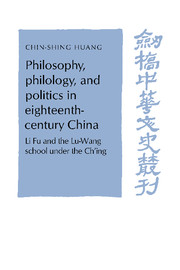 Philosophy, Philology, and Politics in Eighteenth-Century China
Philosophy, Philology, and Politics in Eighteenth-Century China Book contents
- Frontmatter
- Contents
- Foreword by Professor Ying-shih Yü
- Acknowledgments
- Abbreviations
- Introduction
- 1 The original argument (1): “Chu Hsi versus Lu Hsiang-shan” (Chu-Lu i-t'ung): A philosophical interpretation
- 2 The original argument (2): Wang Yang-ming and the problematic of “Chu Hsi versus Lu Hsiang-shan”
- 3 The critical dimension in the Confucian mode of thinking: The conception of the Way as the basis for criticism of the political establishment
- 4 Li Fu: an exemplary Lu-Wang scholar in the Ch'ing dynasty (1): His life
- 5 Li Fu: an exemplary Lu-Wang scholar in the Ch'ing dynasty (2): His thought
- 6 Li Fu and the philological turn
- 7 The price of having a sage-emperor: the assimilation of the tradition of the Way by the political establishment in the light of the K'ang-hsi emperor's governance
- Conclusion
- Chinese glossary
- Bibliography
- Index
2 - The original argument (2): Wang Yang-ming and the problematic of “Chu Hsi versus Lu Hsiang-shan”
Published online by Cambridge University Press: 17 September 2009
- Frontmatter
- Contents
- Foreword by Professor Ying-shih Yü
- Acknowledgments
- Abbreviations
- Introduction
- 1 The original argument (1): “Chu Hsi versus Lu Hsiang-shan” (Chu-Lu i-t'ung): A philosophical interpretation
- 2 The original argument (2): Wang Yang-ming and the problematic of “Chu Hsi versus Lu Hsiang-shan”
- 3 The critical dimension in the Confucian mode of thinking: The conception of the Way as the basis for criticism of the political establishment
- 4 Li Fu: an exemplary Lu-Wang scholar in the Ch'ing dynasty (1): His life
- 5 Li Fu: an exemplary Lu-Wang scholar in the Ch'ing dynasty (2): His thought
- 6 Li Fu and the philological turn
- 7 The price of having a sage-emperor: the assimilation of the tradition of the Way by the political establishment in the light of the K'ang-hsi emperor's governance
- Conclusion
- Chinese glossary
- Bibliography
- Index
Summary
Despite their real intellectual differences, Chu Hsi, Lu Hsiang-shan, and their followers shared something in common. Their uncompromising attitude toward each other's philosophical views reflected their lack of a pluralistic conception of truth. Lu Hsiang-shan was typical of this attitude, as he proclaimed that “there can exist only one most adequate truth; never can two profound meanings hold at the same time” (chih-tang kuei-i ching-i wu-erh). Chu Hsi welcomed various intellectual discussions (chiang-lun) as methods to achieve final truth. Nevertheless, Chu's pluralistic view is confined to a technical sense and does not extend to the nature of truth. For Chu believed that if Lu went through a process of fruitful discussions, Lu would eventually recognize his mistaken ideas. Hence, there is no significant difference between Chu and Lu in their comprehension of the nature of truth. After Chu Hsi and Lu Hsiang-shan passed away, the difference between their views was reinforced because their disciples formed cliques in support of their own master's doctrines. These groups not only continued to develop the criticisms inherited from their masters, but they also intensified the debate in a factious and divisive spirit.
Huang Kan (1152–1221), the major disciple of Chu Hsi, succeeded in restraining Chu's students from conflict with Lu's students. But, after his death, conflict seemed inevitable. The label “Zen” was typically applied by Chu's students to attack Lu's teaching; in turn, the term chih-li (fragmented), was adopted by Lu's students to criticize Chu's scholarship.
- Type
- Chapter
- Information
- Philosophy, Philology, and Politics in Eighteenth-Century ChinaLi Fu and the Lu-Wang School under the Ch'ing, pp. 25 - 46Publisher: Cambridge University PressPrint publication year: 1995


